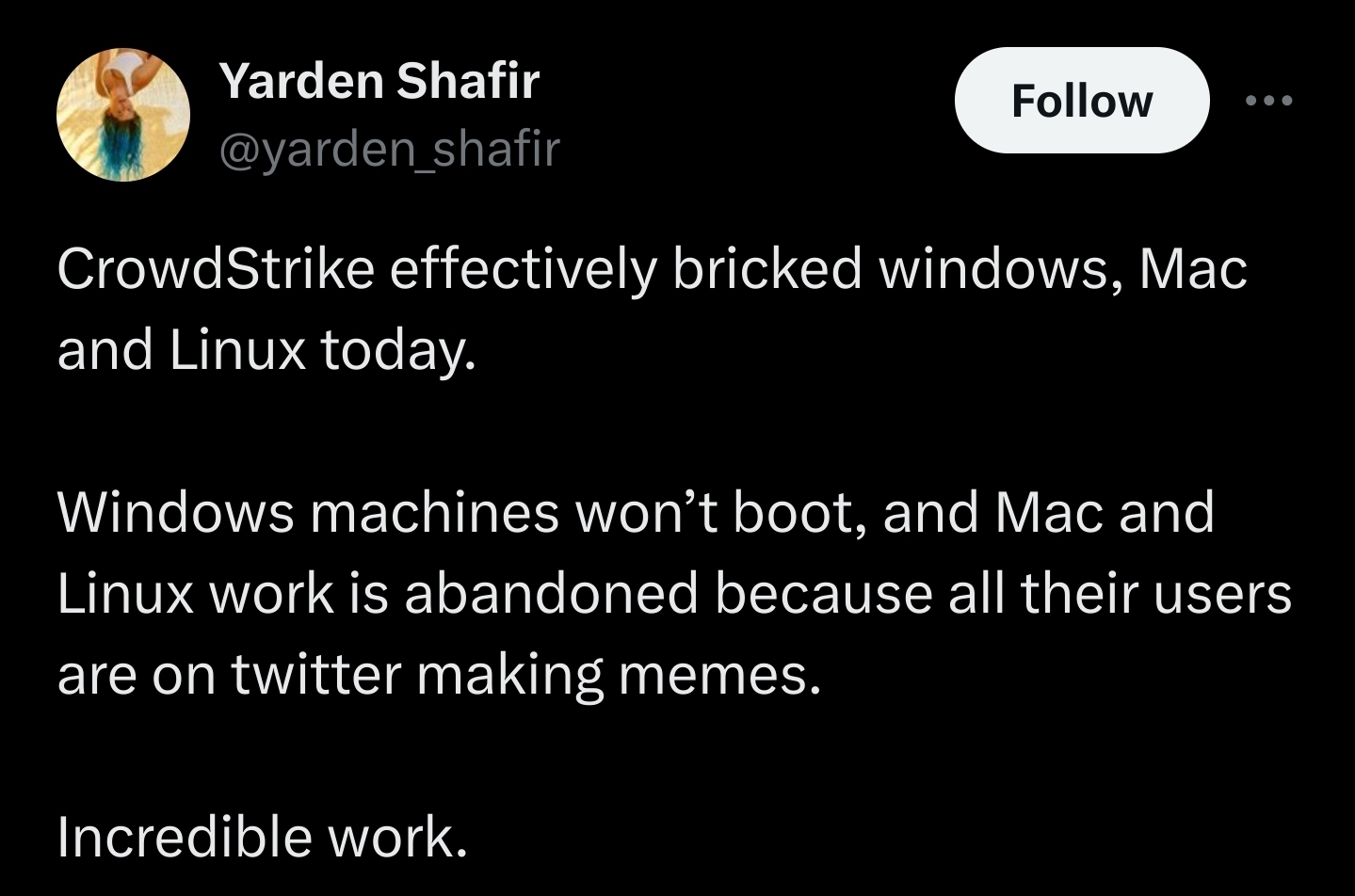this post was submitted on 19 Jul 2024
2023 points (99.1% liked)
linuxmemes
21434 readers
762 users here now
Hint: :q!
Sister communities:
Community rules (click to expand)
1. Follow the site-wide rules
- Instance-wide TOS: https://legal.lemmy.world/tos/
- Lemmy code of conduct: https://join-lemmy.org/docs/code_of_conduct.html
2. Be civil
- Understand the difference between a joke and an insult.
- Do not harrass or attack members of the community for any reason.
- Leave remarks of "peasantry" to the PCMR community. If you dislike an OS/service/application, attack the thing you dislike, not the individuals who use it. Some people may not have a choice.
- Bigotry will not be tolerated.
- These rules are somewhat loosened when the subject is a public figure. Still, do not attack their person or incite harrassment.
3. Post Linux-related content
- Including Unix and BSD.
- Non-Linux content is acceptable as long as it makes a reference to Linux. For example, the poorly made mockery of
sudoin Windows. - No porn. Even if you watch it on a Linux machine.
4. No recent reposts
- Everybody uses Arch btw, can't quit Vim, and wants to interject for a moment. You can stop now.
Please report posts and comments that break these rules!
Important: never execute code or follow advice that you don't understand or can't verify, especially here. The word of the day is credibility. This is a meme community -- even the most helpful comments might just be shitposts that can damage your system. Be aware, be smart, don't fork-bomb your computer.
founded 1 year ago
MODERATORS
you are viewing a single comment's thread
view the rest of the comments
view the rest of the comments

Microsoft*
It's not Microsoft's fault a third party company wrote a kernel module that crashes the OS.
Unlike the mobile world where apps are severely limited and sandboxed, the desktop is completely the opposite. Microsoft has tried many times to limit what programs can do, but encountered a lot of resistance and ultimately had to let it go.
Windows requires that antuviruses run at kernel level, programs which are notoriously buggy and harmful. It is a design flaw to require users to implement mandatory security features in this way. (it is literally not possible to run windows 10 or 11 without an antivirus) Similar security programs on Linux do not run at kernel level, nor should they.
Furthermore, every copy of Windows since Windows 7 requires that kernel modules are signed by Microsoft themselves. Microsoft personally signed off on this code that crashed millions of computers.
Antivirus software for Linux also has kernel access. You can't intercept OS operations like opening files or launching executables without kernel access. And some of the companies I worked at also required antivirus software on Linux servers.
You can absolutely run Windows without an anti-virus, it has plenty of security features built-in.
It's all a matter of trust. Do you trust your engineers to properly configure machines to be secure and not run exes from dubious sources, or do you trust a cybersecurity company to do it for you? Anti-virus software nowadays is more about restricting users from doing stupid shit.
Oh, and signed drivers aren't about Microsoft validating and testing every driver. It's about verifying that the driver comes from a trusted company and isn't tampered with.
Both
If someone hands a toddler a gun and they shoot someone, who's fault is it?
The only thing that can stop a toddler with a gun is a good toddler with a gun
What if that someone is another toddler that found the gun in the street, and it got in the street because it fell off a truck? Your Honor, what if the toddler had murderous intent because they were denied a sucker?
Is this implying that a publicly-traded corporation whose software is installed on millions of computers around the world has the same level of agency and responsibility as a preschooler?
I mean, yes, Microsoft bears responsibility for blindly accepting whatever deployment package CrowdStrike gave it and immediately yeeting it out to 100% of customers via Windows Update without any kind of validation or incremental rollout, and should probably be sued for it. That still doesn't negate the complete and catastrophic failures at every step of the development process on the part of CrowdStrike. It takes a lot of people to fuck up this bad.
Windows didn't do anything, this was an update applied by the Crowdstrike agent.
That's the impressive part of all this. Microsoft didn't do it. CloudStrike did it.
Microsoft left something in a state that allowed CloudStrike to fuck up enough to brick systems.
It's why we spend a lot of time reviewing security analysis of our own software - if there's a way to fuck everything up, it better not because we enabled it to get fucked.
When it comes to IT reliability and security, kinda, yeah.
Windows AV and MDM is a bit of a horror show in the corporate space. I worked somewhere where developers weren't allowed to use WSL because it was blocked by McAfee. We also had 3 different MDMs running and they were slow as balls even though they were modern 8 core laptops.